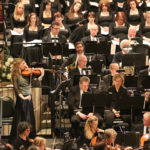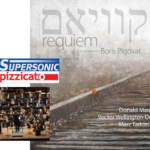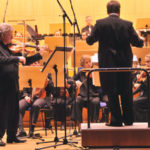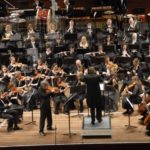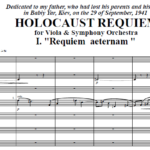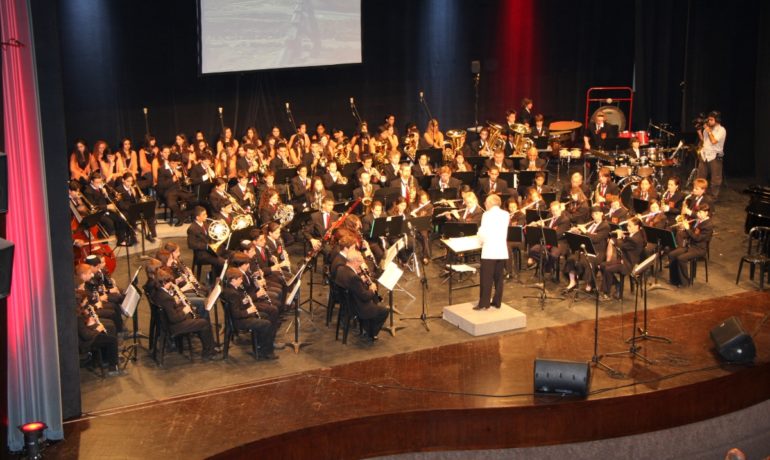
Author: Boris Pigovat


Song of the Sea (2005)
Poem for Symphonic Wind Band
- Duration: ca. 20 minutes
- Picc (=Fl 1), 2 Fls, A.Fl (= Fl 2).Obs, Bsns, 3 Cls, B. Cl, 2 A. Sxs, T. Sx, B. Sx, 4 Hns, 5 Tpts , 3 Tbns, Bar, 2 Tbas, Str. Bass, Perc (6)
In 2005, I composed Song of the Sea for the conductor and director of the Bands and Symphony Orchestra at Murray State University in Murray, Kentucky: Dennis L. Johnson.
I composed the Song of the Sea for Dennis Johnson in 2005.
This is what he said about the piece:
Boris Pigovat is a bright, fresh voice in the world of wind band composition. His “Song of the Sea” is an original tone poem written for myself and the Murray State University Symphonic Wind Ensemble and was premiered in a special performance in Carnegie Hall on March 29 of 2005. This dramatic work captures the beauty and majesty of the open sea as well as its darker and more ominous mood during a ferocious storm. The work carries the listener on a journey through calm and tempest and ends with a grandiose climax that rivals any of the great programmatic composers of this or any era. The wind ensemble and I thoroughly enjoyed the preparation and performance of this masterful work as did the exhilarated crowd in Carnegie Hall that called us back three times. “Song of the Sea” deserves to be on all collegiate and (technically proficient) high school band programs throughout the world. It is a masterpiece for wind band.
That same year, maestro Johnson premiered the piece with the Murray State University Wind Ensemble at Carnegie Hall, in New York.
Later that summer, he performed it at (a repertoire session at) the WASBE Conference in Singapore.
The piece also received the 2005 ACUM Prize (ACUM is the Israeli analog of ASCAP).
In 2009, Song of the Sea had its European premiere in Germany, performed by the Munich Academic Wind Orchestra, conducted by Michael Kummer.
Below is the recording from the premiere in Carnegie Hall.
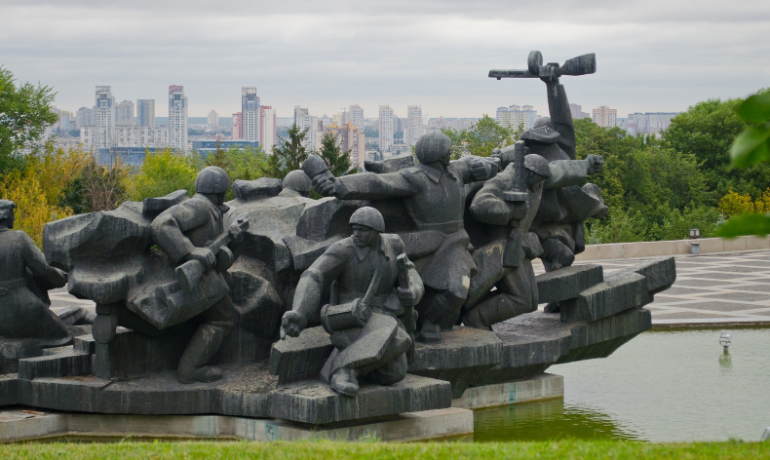
Symphony No.1 "Memorial" (1984; revised in 1987)
- Duration: ca. 28 minutes
- 3 Fls (Picc), 2 Obs (E.Hn), 3 Cls (B.Cl), 2 Bsns, 4 Hns, 3 Tpts, 3 Tbns, Tuba, Timp, Perc (4), Cel, Hp, Str.
The Memorial symphony is dedicated to the victims of World War II, a theme that touched me personally.
I was very excited for the composition’s premiere to be performed by the USSR Symphony Cinema Orchestra, in 1988, in Moscow. For a young composer, this was an amazing opportunity. Plus, this was the first time that I heard the symphony performed live, and it was also recorded — by the best orchestra I could have wished for at that time.
Below, is the live recording of the premiere. The recording is old, and there are some background noises, so please accept my apology for that.
The Ministry of Movies Industry Symphony Orchestra, Moscow
Emin Khachaturian, Conductor
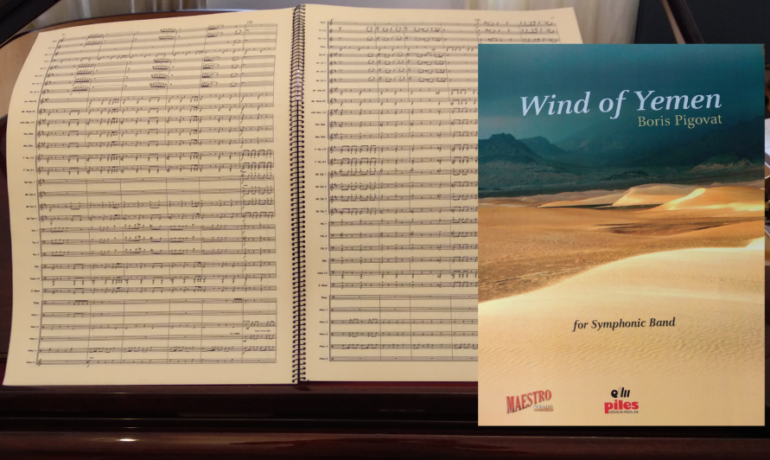
Wind of Yemen (2000)
Poem for Symphonic Wind Band
- Duration: ca. 18 minutes
- Picc, Fl, Ob, Bsn, P.Cl, 3 Cls, A.Cl, B.Cl, A.Sx, T.Sx, B.Sx, 4 Hns, 3 Cnts, 2 Tpts, 3 Tbns, Bar, Tba, Str. Bass, Timp, Perc (4-5)
The symphonic poem Wind of Yemen for Symphonic Wind Band (2000) is based on the traditional tunes and dance melodies which were preserved during the centuries by a very closed society of Yemenite Jews.
The work comprises two connected movements. The first movement depicts a Yemenite desert landscape. The second movement depicts the Yemenite folk celebration.
The concept was suggested to me by Michael Delman.
The task was very challenging for me, this was my first introduction to Yemenite Jewish folklore.
When I was a young composer, in the 1980s, Professor Yuri Alexandrovich Fortunatov gave me some advice:
If you need to compose a piece for folklore that is completely foreign to you, first you must “sink” into it. Only when you feel that you own the style, like it is in your blood beneath the skin, are you ready to compose…
Following that advice, I spent almost three months listening to a massive quantity of audio recordings from Yemenite Jewish folk music, until I was able to internalize the unique feel of its melodic and rhythmic patterns.
In 2000, I completed the Wind of Yemen, and it was premiered by Michael Delman and the Petach-Tikva Conservatoire Symphonic Band.
Wind of Yemen was performed at the Asian Music Festival 2003 (in Tokyo) by the Kosei Wind Orchestra, conducted by Douglas Bostock.
In 2009, it was performed at the WASBE conference by CAM Bétera, conducted by Luis Serrano Alarcón.
In 2010, it was performed in Mano a Mano festival, Bunol, Spain, by CIM La Armónica de Buñol (Valencia), conducted by Frank De Vuyst.
That same year, Wind of Yemen was published in Spain by Piles Editorial de Musica.
In 2015, it was performed at the WASBE conference (in San Jose, California, USA), by the National Youth Symphonic Band of Israel, conducted by Motti Miron.
In 2018, it was performed at the Singapore International Band Festival, by the Orchestra Collective of Singapore, conducted by Yibin Seow.
Below are recordings from Singapore, Tokyo and from the 2009 WASBE conference. You can also listen to the Mano a Mano festival performance here .
Singapore International Band Festival, 2009
Asian Music Festival, Tokyo, 2003
2009 WASBE Conference, Cincinnati, USA
I thought that several other of the performances
were also very good, but here is
where specific works stand out in my mind
as being significant. Boris Pigovat’s Wind of
Yemen performed by the Symphonic Band
of Centre Artístic Musical de Bétera was
marvelous...
I also enjoyed The Winds of Yemen by Boris Pigovat, with its evocative ethnic music. He has a superb website with details of his music, including the Song of the Sea, premiered in Carnegie hall by Murray State University Wind Ensemble conducted by Dennis Johnson. As I reported in a recent homepage, this work was a great success in its recent German premiere, conducted by Michael Kumnmer, and I have no doubt that The Winds of Yemen will join it as a fine example of this composer's music.
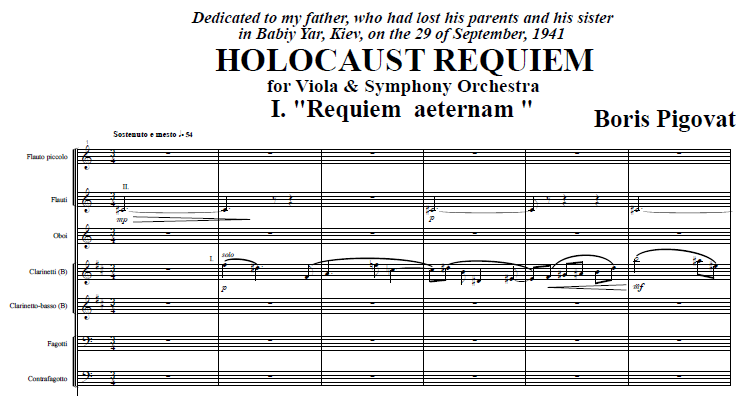
Oct, 2001: Memorial evening dedicated to the Babi Yar tragedy, Kiev, Ukraine
The Memorial evening dedicated to Babi Yar tragedy was the world premiere of Requiem. I was openly excited to have the premiere in that historic location, where the tragedy took place. My father’s family were murdered in Babi Yar by the Nazis in September of 1941, and I was feeling the suffering of this deep personal tragedy when I wrote Requiem.
The outstanding performance by violist Rainer Moog and the Symphony Orchestra of National Philarmonic Society of Ukraine, conducted by Roman Kofman, was the best premiere imaginable.
Later, in his interview to Ukrainian daily newspaper “The Day” from October 9 2001, Roman Kofman said:
I’m sure that the Holocaust Requeim has a great future. Boris Pigovat’s composition is very sophisticated, but isn’t flowery of the pretentious. It is simple but not primitive, it is frank and heartfelt, an outstanding work.
Below is a live recording of that outstanding premiere.
- Duration: ca. 46 minutes
- 3 Fls (Picc), 2 Obs, 3 Cls (B.Cl) 2 Bsns, C.Bn, 4 Hns, 3 Tpts, 3 Tbns, Tba, Timp, Perc (4), Cel, Pno, Hp, Vla solo, Str.

Holocaust Requiem for Viola and Symphony Orchestra (1994-1995)
- Duration: ca. 46 minutes
- 3 Fls (Picc), 2 Obs, 3 Cls (B.Cl) 2 Bsns, C.Bn, 4 Hns, 3 Tpts, 3 Tbns, Tba, Timp, Perc (4), Cel, Pno, Hp, Vla solo, Str.
For years, I felt the necessity to write a work dedicated to the Holocaust. After my immigration to Israel I started to consider different ideas for such a work. At first, I wanted to write a requiem for the standard orchestration: soloists, choir, orchestra and, maybe, narrator. At that time, Yuri Gandelsman, the principal violist of the Israel Philharmonic Orchestra, asked me to write something for him. He was an excellent violist whom I had known for years – we learned at the same time at Gnessin College and then at Gnessin Institute (Academy of Music). So, when he asked me to write for him a work for viola and symphony orchestra, I suddenly understood – I would write a requiem for viola and symphony orchestra! I would write the work without the text, without the choir and solo singers, but I would try to save the tragic atmosphere of a traditional requiem.
I dedicated Requiem to my father, whose family was murdered in Babi Yar by Nazis in September of 1941. It took me about two years to write it, during which I felt that he was waiting for me to complete it. The day after I finished writing Requiem, my father passed away.
In the end, Yuri Gandelsman did not perform Requiem.
In October 1995, less than a year after it’s composition, Requiem received the ACUM (Israeli ASCAP) award.
The world premiere of Requiem took place in October 2001, at the memorial evening dedicated to Babi Yar tragedy, in Kiev, by remarkable violist Rainer Moog and the Symphony Orchestra of National Philarmonic Society of Ukraine, conducted by Roman Kofman.
Requiem was performed again seven years later at the Concert of Remembrance for the 70th Anniversary of Kristallnacht, at an outstanding performance by Donald Maurice and the Vector Wellington Orchestra in New Zealand, conducted by Marc Taddei. Later, a live recording was released by Atoll with three more of my pieces.
After listening for the Kiev recording of Requiem, violist Anna Serova and conductor Nicola Guerini pushed Naxos to record Requiem. The Naxos compilation includes another piece that I wrote for Anna: Poem of Dawn for Viola and Symphony Orchestra.
Both the Atoll CD (in 2011) and the Naxos CD (in 2015) received Pizzicato’s Supersonic Award, and the Naxos CD was also nominated for the 2016 ICMA award.
In 2021, Professor Maurice and his PhD student Xi (Lucy) Liu produced a film Lacrimosa Dies Illa, which is based on Requiem, as Lucy’s PhD research. The film premiere took place in Wellington’s Penthouse Cinema in May 2021.
Click here for more information about this documentary. The film itself is available online here (the trailer can be found here).
In September 2023, the US premiere of Holocaust Requiem took place in Annapolis by Peter Minkler and Annapolis Symphony Orchestra, conducted by José-Luis Novo.
I am honored to have such wonderful performers for the piece!
Below is a live recording of the outstanding premiere performed in Kiev and few samples from a performance in Wellington. Additional recordings and information about Requiem performances can be found in my website by using the SEARCH widget from the main menu or the sidebar (type requiem).
Recording from Memorial Evening dedicated to Babi Yar tradegy in Kiev, 2001
Rainer Moog, Viola
Roman Kofman, Conductor
Symphony Orchestra National Philarmonic Society of Ukraine
Samples from recording from Concert of Remenbrance for Kristallnacht Anniversary in Wellington, 2008
Donald Maurice, Viola
Marc Taddei, Conductor
Vector Wellington Orchestra
Pigovat's Holocaust Requiem may prove to be one of the three finest masterpieces ever written for viola, with the Bartók and Walton Viola concertos. It now primarily needs time and exposure and to become known in contemporary 21st century literature.


